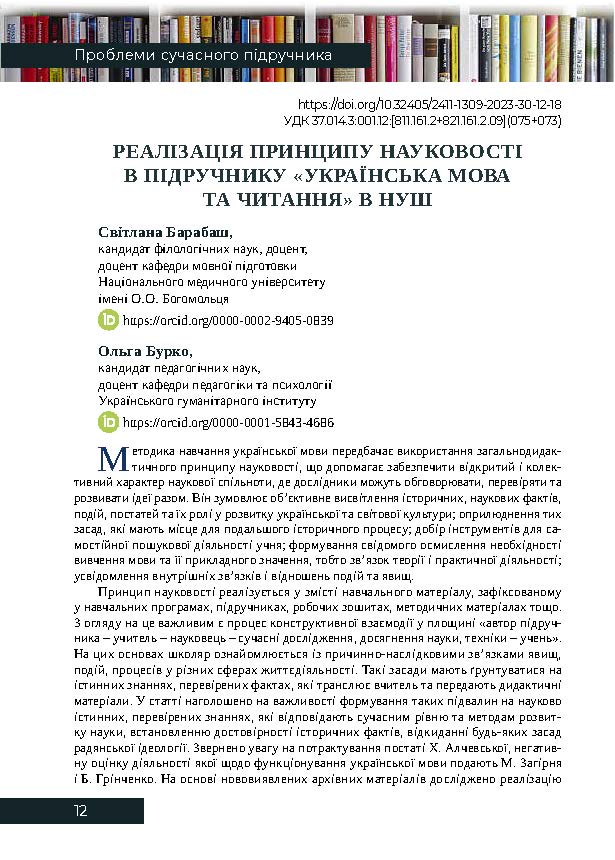The Realization of the Principle of Scientificness in the Textbook “Ukrainian Language and Reading” in NUS

Published 2023-07-24
Keywords
- NUS,
- school textbook,
- typical educational programs,
- problem of the principle of scientificness,
- critical thinking
- H. Alchevska,
- B. Hrinchenko ...More
How to Cite

This work is licensed under a Creative Commons Attribution-NonCommercial-ShareAlike 4.0 International License.
Abstract
The methodology of teaching the Ukrainian language involves the use of the general didactic principle of scientificness, which helps ensure an open and collective nature of the scientific community where researchers can discuss, test, and develop ideas together. It entails an objective representation of historical and scientific facts, events, figures, and their role in the development of Ukrainian and world culture; the publication of principles that are relevant to further historical processes; the selection of tools for independent research activities by students; the formation of a conscious understanding of the necessity of language study and its practical significance, i.e., the connection between theory and practical activities; the realization of internal connections and relationships between events and phenomena.
The principle of scientificness is realized in the content of educational materials fixed in curricula, textbooks, workbooks and methodological materials. Therefore, the process of constructive interaction in the plane of "textbook author - teacher - researcher - contemporary research and scientific achievements - student" is important. Based on these foundations, students become familiar with cause-and-effect relationships of phenomena, events, and processes in various areas of life. Such principles should be based on true knowledge, verified facts transmitted by the teacher, and didactic materials. The article emphasizes the importance of establishing such foundations on scientifically accurate and verified knowledge that corresponds to the modern level and methods of scientific development, establishing the reliability of historical facts, and rejecting any principles of Soviet ideology. Attention is drawn to the interpretation of the figure of H. Alchevska, with a negative assessment of her activities regarding the functioning of the Ukrainian language presented by M. Zahirnia and B. Hrinchenko. Based on newly discovered archival materials, the realization of the principle of scientificness in the textbook "Ukrainian Language and Reading" (2020) by N. Kravtsova, V. Romanova, and O. Prydatok is examined.
Ways to overcome the situation of students acquiring false knowledge through the materials presented in the textbook are proposed. Attention is focused on the necessity of developing critical thinking in students, who, through learning, are formed as fully independent individuals that contribute to the positive progressive changes of the world through daily exploration, not only within the context of their own country but also globally. The importance of filling textbooks with accurate materials remains relevant.
Downloads
References
- Бурко, О., Барабаш, С. (2022). Мовна позиція Б. Грінченка та Х. Алчевської: суголосся доби чи позиція? Закарпатські філологічні студії. 24. Т. ІІ.
- Волох, С. По дорозі до рідної школи. https://elib.nlu.org.ua/view.html?&id=13257
- Грінченкo, Б. Лист до Марії Грінченко від VII.23.1887. ІР НБУВ. Ф. ІІІ. Од. зб. 42185.
- Грінченко, М. Адреси. ІР НБУВ. Ф. 170. Од. зб. 639.
- Донченко, Т. (2004). Власне методичні принципи навчання української мови. Українська мова і література в школі. 2.
- Караман, С. (2000). Методика навчання української мови в гімназії. Київ: Ленвіт.
- Кравцова, Н., Романова, В., Придаток, О. (2020). Українська мова та читання : підручник для 3 класу. Тернопіль: Підручники і посібники.
- Кучеренко, І. (2014). Теоретичні і методичні засади сучасного уроку української мови в середній школі. Умань: ФОП Жовтий О. О.
- Лісовий, О. (2023). Як зацікавити дітей наукою? https://nus.org.ua/articles/tsytaty-oksena-lisovogo-pro-osvitu-nauku-ta-vijnu-dobirka nush/].
- Пентилюк, М. (2011). Актуальні проблеми сучасної лінгводидактики. Київ: Ленвіт.
- Савченко, О. (2013). Дидактика початкової освіти: підручник для вищих навчальних закладів. 2-ге вид. Київ: Грамота.
- Савченко, О.Я. (ред.). (2022). Типова освітня програма. https://mon.gov.ua/storage/app/media/zagalna%20serednya/programy-1-4-klas/2022/08/15/Typova.osvitnya.prohrama.1-4/Typova.osvitnya.prohrama.3-4.-Savchenko.pdf
- Хмелєва, Н. (2013). Принцип науковості та оперативності в наукових дослідженнях. Управління розвитком. 17.
- Шиян, Р.Б. (ред). (2022). Типова освітня програма. https://mon.gov.ua/storage/app/media/zagalna%20serednya/programy-1-4-klas/2022/08/15/Typova.osvitnya.prohrama.1-4/Typova.osvitnya.prohrama.3-4.Shyyan.pdf
- Юрійчук, Н. (2004). До проблеми навчання материнської мови через призму ноосферної науки. Українська мова і література в школі. 2.
- Burko, O., Barabash, S. (2022). Movna pozy`ciya B. Grinchenka ta X. Alchevs`koyi: sugolossya doby` chy` pozy`ciya? Zakarpats`ki filologichni studiyi. 24. T. II. (in Ukrainian).
- Volox, S. Po dorozi do ridnoyi shkoly`. https://elib.nlu.org.ua/view.html?&id=13257 (in Ukrainian).
- Grinchenko, B. Ly`st do Mariyi Grinchenko vid VII.23.1887. IR NBUV. F. III. Od. zb. 42185. (in Ukrainian).
- Grinchenko, M. Adresy`. IR NBUV. F. 170. Od. zb. 639. (in Ukrainian).
- Donchenko, T. (2004). Vlasne metody`chni pry`ncy`py` navchannya ukrayins`koyi movy`. Ukrayins`ka mova i literatura v shkoli. 2. (in Ukrainian).
- Karaman, S. (2000). Metody`ka navchannya ukrayins`koyi movy` v gimnaziyi. Ky`yiv: Lenvit. (in Ukrainian).
- Kravczova, N., Romanova, V., Pry`datok, O. (2020). Ukrayins`ka mova ta chy`tannya : pidruchny`k dlya 3 klasu. Ternopil`: Pidruchny`ky` i posibny`ky`. (in Ukrainian).
- Kucherenko, I. (2014). Teorety`chni i metody`chni zasady` suchasnogo uroku ukrayins`koyi movy` v serednij shkoli. Uman`: FOP Zhovty`j O. O. (in Ukrainian).
- Lisovy`j, O. (2023). Yak zacikavy`ty` ditej naukoyu? https://nus.org.ua/articles/tsytaty-oksena-lisovogo-pro-osvitu-nauku-ta-vijnu-dobirka nush/. (in Ukrainian).
- Penty`lyuk, M. (2011). Aktual`ni problemy` suchasnoyi lingvody`dakty`ky`. Ky`yiv: Lenvit. (in Ukrainian).
- Savchenko, O. (2013). Dy`dakty`ka pochatkovoyi osvity`: pidruchny`k dlya vy`shhy`x navchal`ny`x zakladiv. 2-ge vy`d. Ky`yiv: Gramota. (in Ukrainian).
- Savchenko, O.Ya. (red.). (2022). Ty`pova osvitnya programa. https://mon.gov.ua/storage/app/media/zagalna%20serednya/programy-1-4-klas/2022/08/15/Typova.osvitnya.prohrama.1-4/Typova.osvitnya.prohrama.3-4.-Savchenko.pdf (in Ukrainian).
- Xmelyeva, N. (2013). Pry`ncy`p naukovosti ta operaty`vnosti v naukovy`x doslidzhennyax. Upravlinnya rozvy`tkom. 17. (in Ukrainian).
- Shy`yan, R.B. (red). (2022). Ty`pova osvitnya programa. https://mon.gov.ua/storage/app/media/zagalna%20serednya/programy-1-4-klas/2022/08/15/Typova.osvitnya.prohrama.1-4/Typova.osvitnya.prohrama.3-4.Shyyan.pdf (in Ukrainian).
- Yurijchuk, N. (2004). Do problemy` navchannya matery`ns`koyi movy` cherez pry`zmu noosfernoyi nauky`. Ukrayins`ka mova i literatura v shkoli. 2. (in Ukrainian).
